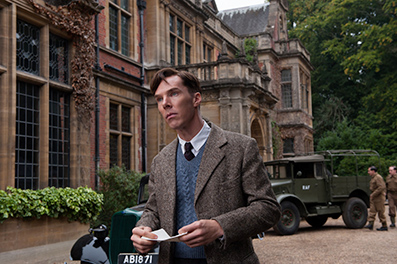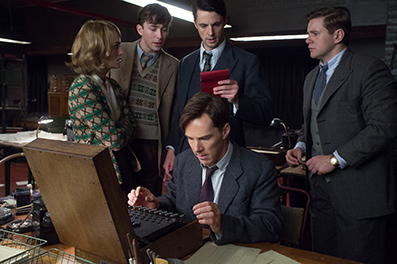"I was just making my first run into Hollywood, and what I was
seeing were action thrillers and superhero movies. Graham’s script
came my way, and it was presented to me as 'probably not what I
was looking for.' But I loved it, and had the same experience I think
most viewers will have – I’d never heard of Alan Turing. I became
obsessed with him, and that obsession won the producers over." |
Director, Morten Tyldum |
When I discovered Benedict Cumberbatch's comedic talents in 2008, I had no idea, seven years later, he would become one of the most celebrated and ubiquitous actors of his generation. Who knew? Yes, the lead role in a hit TV show helps. Sherlock seems to have wowed the world (I love the story – apocryphal? – of Cumberbatch being at a US media event and Cheers' and CSI's Ted Danson suddenly pointed at him and announced "Fuck me, it's Sherlock!") In case you're curious about his comedy credentials, I suggest you hunt out the thirteen glorious hours of a BBC Radio 4 sitcom called Cabin Pressure. In it, Cumberbatch plays the captain of a private jet. Cumberbatch is seriously good as a nervy, ill at ease pilot who adores flying but knows he has no natural ability, a Captain who is never easily acknowledged as such. The show's fan base exploded when Sherlock fans realised what Cumberbatch did on his increasingly rare spare weekends in the illustrious company of fellow actors Stephanie Cole, Roger Allum and John Finnemore (who created and wrote all the episodes). Cabin Pressure is a real gem of a sitcom (plaudits to all equally; no one could have anticipated the career detonation of Mr. C) and it bowed out last Christmas with a wonderfully satisfying 'graduation' episode. It's a testament to Cumberbatch's loyalty that despite his own giant star's exploding status, he still found time to round off the final episode of my favourite radio comedy. Captain Martin Crieff, you will be missed.

Now, Cumberbatch has already played Stephen Hawking (in 2004's Hawking), and Eddie Redmayne has established himself as Cumberbatch's serious contender in the Oscar race playing Hawking himself. Cumberbatch's Sherlock is a genius of a kind (in his own words, a "high functioning sociopath") and now he's playing Alan Turing, the father of modern computers. The fruits of Turing's unique brain could be argued to have saved 14 million lives and knocked two years off WWII... In interviews, Cumberbatch resists the spurious 'genius' link to these characters (and I think he's right to do so) but he has to concede that despite the psychological, social and sexual differences between all three extraordinary men, there is a thread running through these personalities and Cumberbatch seems anxious and well suited to pull on and worry that particular thread. That said, his Turing is a haunted man, a gay man (in those days, 'gay' was happy and 'homosexual' was gay) whose love for his only friend in school has irrevocably shaped his emotional landscape. His mind is a brilliant one taking on theoretical concepts that I'm afraid are so well beyond my own ability to conceive, they may as well be written by the Enigma machine itself. Dumbing down is usually a concept I abhor but this was welcome in this movie's case. How do you make a film about a man whose mind encompasses ideas of which a layman can have no conception? Well, you make The Imitation Game... Turing posits the idea of a series a questions to determine if you are a man or machine, a concept Philip K. Dick took to a logical extreme is designing his 'Andy' test in Do Androids Dream of Electric Sheep, a book better known as the movie Blade Runner. As Cumberbatch explains his theories, I had visions of the breathing Voight-Kampff machine sitting and staring at me...
The movie is solid in a few loose senses of the word. It does exactly what it says on the tin (and if that's too much of a cliché for you, then avoid my reviews like the plague). It's predictably dependable in a good way. It's solid in terms of film craft and narrative beats but it's also solid in the sense of being a good old fashioned and well-crafted film about a man who was marginalised despite the fact that his contribution to the war effort was without peer, without equal and almost immeasurably quantifiable. In plainer words, if you know Alan Turing's story, there are no real surprises (how can there be?) But this is not a negative. When Turing's moment comes, there was lone applause behind me and, following that, a knowing ripple of laughter from the rest of the audience. The man I sat next to simply announced as the end titles began "That was good." And it is. No question. Every once in a while, it's good to celebrate the best of the 'standard'. I'm trying not to sound nitpickingly negative but in terms of cinematic innovation, there is nothing here to feast upon but I do want to start a movement that celebrates movies and people like this... In today's mainstream cinema of spandex and (Tony) stark unoriginality, movies like The Imitation Game are a breath of fresh air. They remind us what good movies used to be like.
The supporting cast is a who's who of British talent. First up is Joan, played by Keira Knightley. Lambasted critically for trying to edge out of her beauty-comfort zone – odd and risky choices like Domino and someone in serious need of Freudian analysis in Cronenberg's A Dangerous Method – Knightley here is not in Beckham territory anymore and neither is she flouncing about with pirates. Dare I say it but in The Imitation Game, she plays a convincing grown up. Yes, that model-come-hither beauty is still there but what were angles are now curves and that goes for the nuances of her performance too. Different shades of Turing are allowed to surface as he finds a like mind in Joan's exquisite head. A personal favourite Mark Strong turns up as a perfectly cast spymaster. Although never the star of the show, he always adds considerable gravitas and much dry wit to whatever role he plays. Charles Dance fresh off the loo, shot through with arrows, is Turing's commanding officer and a man bested in rank only by the single figure above him in the hierarchy, Winston Churchill himself. Cast for his mask of exasperation, Dance is a good foil for the flighty and socially inept Turing. Roy Kinnear, who flits from sitcom to Bond and Shakespeare, plays the curious detective who is convinced that Turing is hiding something other than his sexuality. He's part of the framing tale, Cumberbatch telling his own story in a police interview years after the war. Watchman's Ozymandias himself, Matthew Goode, plays the cool guy of the code-cracking group, the one Turing really has to win over to get everyone else in line. Allen Leach of Downton Abbey plays the only sympathetic code-breaker at the start of Turing's time at Bletchley Park. But there are secrets even within the code-breakers...

The mathematical feat that Turing was proposing was to create a machine (in reality named, Bombe, in the movie, named after his first lost love, Christopher) that could calculate on a 24 hour basis the daily changing code generated by and re-read by an Enigma machine. The permutations possible are mind altering in number (there's some great comedy in advanced mathematics and statistics) and the machine has a small window in which to make its daily calculations. Now it's no spoiler that the man succeeds. Benedict Cumberbatch's asocial, speech-impedimented and gauche turn as Turing is as captivating a performance I've seen for a while. But he has great support and not just among his fellow actors. Shoring the movie up is a lovely, lilting and haunting symphonic score by Alexandre Desplat and let's give the location manager a nod (David Broder) as each 'real' location evoked 40s and 50s Britain without me once thinking "In 2014, I wonder where they found a village that looked like it was frozen in time from the war years?" The production design mistake movies like this usually make is to have the labels and props look 'vintage' when of course at the time they would have been brand new. Imagine Ridley Scott's Rome where all the white statues are garishly painted (the reality at that time). Truth mutates into believability. It was thrilling to see Turing's machine look colourful and vibrant and alive! While it whirred, I thought of Johnny Ive and how proud he would have been to have had a fraction of its effects mirrored in his own designs.
I know it may sound a little odd but I think the award success of the film has been aided by the fact that the American Academy has so little meat to chew on these days. What would have been ordinary in another time period has now become extraordinary. I see a time when the Academy splits apart – one set of awards for pre-existing properties, sequels and franchises and another for original movie making... I don't think The Imitation Game will clean up come Oscar night but I will be rooting for it. One last thing. I don't think it's a spoiler to say that Alan Turing killed himself (this is not a necessary part of the narrative of the movie) by supposedly ingesting a cyanide-laced apple. There is some dispute that this actually was the cause of death. But on meeting Steve Jobs, Stephen Fry once asked if the idea of naming his company 'Apple' (remember the logo has a bite out of it...) was a nod to the method of suicide used by the father of the modern computer... Jobs said "No, it isn't, but God, we wish it were..." So do I... Let's look at that logo and remember this extraordinary man.
|